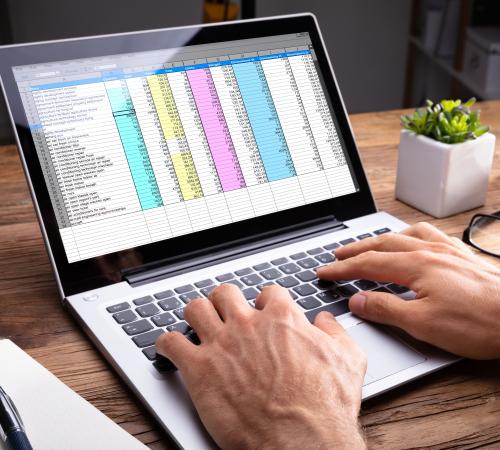

Managing the financial aspects of your small business can seem daunting, especially when you’re focused on delivering quality products or services. Understanding the basics of accounting can be essential for your business’s success and tax compliance.
What is accounting?
Accounting is the process of recording, organising, and analysing a business’s financial transactions. It can help you track money coming in and going out, understand your business’s financial health, and make informed decisions.
Every business, regardless of size, needs accounting to monitor profitability and fulfil tax obligations. Good accounting practices can help you avoid financial pitfalls and identify growth opportunities.
What is involved in small business accounting?
Small business accounting involves several key activities, including:
- Transaction recording: Tracking all financial activities, from sales to expenses
- Managing receipts and invoices: Documenting all sales and purchases with proper paperwork
- Bank reconciliation: Comparing your records with bank statements for accuracy
- Payroll management: Calculating employee wages, withholding taxes, and distributing payments
- Accounts payable: Tracking and paying bills from suppliers and vendors on time
- Cash flow management: Monitoring money coming in and going out to help ensure financial obligations are met
- Financial reporting: Creating statements like profit and loss reports, balance sheets, and cash flow statements
- Tax preparation: Organising financial information for accurate and timely tax filing.
Small businesses may handle these tasks in-house or outsource them depending on their size, complexity, and available resources. Many small businesses hire an accountant to handle their finances, taxes, and accounts.
The difference between accounting and bookkeeping
While often used interchangeably, bookkeeping and accounting serve different purposes in managing your finances.
Bookkeeping is the systematic recording of financial transactions. It’s the day-to-day process of logging sales, purchases, receipts and payments.
Accounting, on the other hand, takes a broader view. It involves analysing, interpreting, and communicating the financial data collected through bookkeeping. Accountants use this information to prepare financial statements, assess business performance, ensure tax compliance, and provide strategic financial advice.
For small businesses, the same person might handle both bookkeeping and accounting initially, but as your business grows, you may benefit from specialised expertise in each area.
How to do small business accounting
How you approach accounting may vary depending on your business type and size. A small bakery will have different accounting needs than an independent financial adviser. However, the following steps are best practices.
Business bank accounts
Limited companies may be legally required (external link) to use a business bank account.
While not legally obligated for all businesses, having a dedicated business bank account can be beneficial. It helps create a clear boundary between personal and business transactions, which can make it easier to track business income and expenses. This separation can be invaluable during tax season and essential if you’re ever audited.
Additionally, business accounts often have features tailored to business needs, such as multiple user access, higher transaction limits, and integration with accounting software.
Accounting methods
Small businesses typically choose between two main accounting methods: cash basis and accrual basis.
Cash basis accounting records income when you receive payment and expenses when you pay them, regardless of when the transaction was initiated. This approach works well for small businesses that deal primarily in immediate transactions, like boutique shops, bakeries, or personal trainers.
Accrual basis accounting records income when it’s earned and expenses when they’re incurred, regardless of when money changes hands. For instance, an optician using accrual accounting would record revenue when they provide an eye exam, not when the patient pays their bill, which could happen weeks later.
Cash basis can be more straightforward, offering a clear picture of your immediate cash position, while accrual basis can provide a more accurate long-term view of your business performance by matching revenue with the expenses incurred to generate it.
Your business type, size, and plans might influence which method you choose.
Recording transactions
Expense tracking can be critical for business success and tax compliance. Every business transaction, whether it’s purchasing inventory for a delicatessen, paying rent for a wellbeing centre, or buying software for an independent financial advisory practice, must be documented.1 (external link)
HM Revenue and Customs (HMRC) (external link) can review your records to ensure you’re paying the right amount of tax.
Many small businesses develop a system for capturing receipts and invoicing immediately, whether through digital apps, file folders, or integrated accounting software. Categorising expenses consistently according to tax-relevant categories can ensure you’re able to claim legitimate deductions. It can also help you understand profitability and provide valuable insights into spending patterns, informing business decisions.
Reconcile transactions
Reconciliation involves comparing your internal accounting records with your bank statements to ensure they match. Discrepancies can arise for various reasons, including timing differences (when you record a cheque versus when it clears), bank fees, interest earned, or simple recording errors.
Regular reconciliation – many small business owners perform this monthly – can catch errors early, potentially preventing fraud and ensuring accurate financial reporting.
The process typically involves matching each transaction in your accounting records to your bank statement, investigating any differences, and making adjustments as needed to ensure alignment.
Managing business taxes
Tax obligations vary by business structure, size, and location. Establishing a system for tracking tax-related information throughout the year can help you during tax season.
All businesses must maintain organised records of deductible expenses.
You might consider setting aside a percentage of your income in a dedicated tax savings account to ensure funds are available when tax payments are due. Many small business owners benefit from professional tax advice, especially as their business grows or regulations change.
Managing cash flow
Cash flow management involves monitoring and optimising the timing of money flowing in and out of your business to help ensure you meet your financial obligations.
Effective cash flow management often starts with creating a cash flow forecast. This projection can help you anticipate periods when cash might be tight and plan accordingly.
To improve cash flow, you might:
- Invoice promptly and follow up on overdue payments
- Consider offering discounts for early payment
- Negotiate favourable payment terms with suppliers
- Establish a cash reserve for unexpected expenses
- Review regular outgoings to identify potential savings.
Many businesses find that using tools like cash flow statements and forecasting software can help them anticipate potential problems.
Setting up payroll
If your business employs staff, you may need to establish payroll (external link)processes.
You can start by registering as an employer (external link) with HMRC. This involves:
- Getting a PAYE (Pay As You Earn) reference number.
- Setting up PAYE Online (external link) services.
- Choosing a payroll software (external link) that meets HMRC requirements.
When running payroll, you may need to:
- Calculate employee pay
- Determine the correct tax and National Insurance deductions
- Process any pension contributions
- Handle statutory payments like sick pay and maternity pay
- Submit payroll information to HMRC through Real Time Information (RTI) (external link)
- Provide employees with payslips.
Keeping comprehensive payroll records, including hours worked, payments made, and deductions taken, is considered best practice and may be required by HMRC.
Many small businesses find that outsourcing payroll to specialists or using dedicated payroll software saves time and reduces the risk of errors, especially as regulations change frequently.
Reporting
Regular financial reporting can provide crucial insights into your business’s performance and health and inform decision-making.
There are many types of financial documents. The three key reports that many small businesses create and review regularly are:
- Profit and loss statement (income statement): Shows your revenue, expenses, and profit over a specific period. This can help you understand which areas of your business are most profitable.
- Balance sheet: Provides a snapshot of your business’s assets, liabilities, and equity at a specific point in time. This can help you assess your business’s overall financial position and can be particularly useful when considering investments in new equipment or expansion opportunities.
- Cash flow statement: Tracks the movement of cash in and out of your business, categorised by operating, investing, and financing activities. This can help identify potential cash shortages before they become critical.
Many small businesses review these reports monthly or quarterly to spot trends, identify improvement areas, and make informed business decisions. Many accounting software options can generate these reports automatically, making regular review more feasible for busy small business owners.
Accounting software
The right accounting software can save time, reduce errors, and provide valuable insights.
Accounting software typically offers features like:
- Invoice creation and management
- Expense tracking and categorisation
- VAT calculations and returns
- Financial report generation
- Payroll processing.
Many business owners start by considering their specific needs when choosing accounting software. For instance, retail businesses like bookshops might prioritise inventory management features, while service providers like nutritional therapists might focus more on client billing capabilities.
Disclaimer:
At Hiscox, we want to help your small business thrive. Our blog has many articles you may find relevant and useful as your business grows. But these articles aren’t professional advice. So, to find out more on a subject we cover here, please seek professional assistance.





